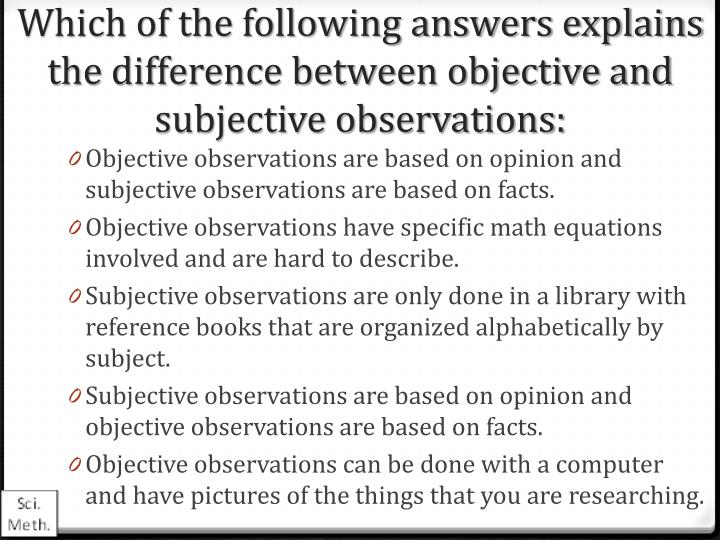

Hence, understanding the differences between objective vs subjective data is important for the medical fraternity and also for addressing diseases and medical conditions that the patients may be suffering from. There could be many subjective data that also could be crucial in giving the right treatment to the patients. However, we need to understand that the data or information that doctors have to deal with may not always be a numerical value. These reports are considered important because they help the doctors and healthcare providers to diagnose the diseases or medical conditions and start treatment accordingly. Healthcare professionals often have to come across a lot of vitals, numbers, lab values, and test results. They are considered critical and extremely vital for taking note of the overall condition of the patient and then offering the right treatment accordingly. It does not store any personal data.When we look at finer points of nursing and patient care, there are scores of scientific and medical terms that are considered very important and indispensable. The cookie is set by the GDPR Cookie Consent plugin and is used to store whether or not user has consented to the use of cookies. The cookie is used to store the user consent for the cookies in the category "Performance". This cookie is set by GDPR Cookie Consent plugin. The cookie is used to store the user consent for the cookies in the category "Other. The cookies is used to store the user consent for the cookies in the category "Necessary". The cookie is set by GDPR cookie consent to record the user consent for the cookies in the category "Functional". The cookie is used to store the user consent for the cookies in the category "Analytics". These cookies ensure basic functionalities and security features of the website, anonymously. Necessary cookies are absolutely essential for the website to function properly. Depending on how and where the observation takes place and for what purpose, there are different kinds of observational methods. The observer may study the outward activities of other persons in a systematic manner (objective observation), or may observe himself by looking within to analyze his thought processes (subjective observation). The observer may be a part of the situation to be observed (participant observation), or may observe from a distance without being a part of the event (non-participant observation). The observation may take place in the artificial setting of a laboratory (laboratory observation), or in the natural field settings (naturalistic observation). Yet the observational methods have their own advantages. Recently, many psychological instruments are used to record the inner experiences. Both the methods have considerable utility in psychology. The subjective observation, called introspection, asks a person to look within, and report his mental experiences. Psychologists use objective observation to study the overt activities of the organism. Objective observation is concerned with the events of the external world.

When some objects or events are observed in a scientific manner, those objects or events are examined systematically. Scientific observation cannot be regarded as just a simple perception of a layman. Observation forms the basis of any scientific enquiry.

The literal meaning of observation is clear perception of some objects or events. Observing occurrence of events in the natural settings is called naturalistic observation. Observation can be made either in the laboratory by creating an artificial situation, or can be made in natural settings, where the events take place. Psychology studies both overt and covert activities using objective and subjective observations, respectively. Such type of observation is called subjective observation, which is otherwise known as introspection. Only the person himself can be aware of these experiences and can observe himself. But when a person feels pain, hunger, or fatigue, it is not possible for others to observe these experiences. It is possible for a common man to observe the external or overt activities, and this type of observation is objective observation. In objective observation, a single observer or a number of observers can observe, whose findings can be crosschecked, and verified. Observation can be objective or subjective. Like all other sciences, psychology also uses this method to study its subject matter. Every science is based on observation of facts, and hence, observational methods are most common to every science.


 0 kommentar(er)
0 kommentar(er)
